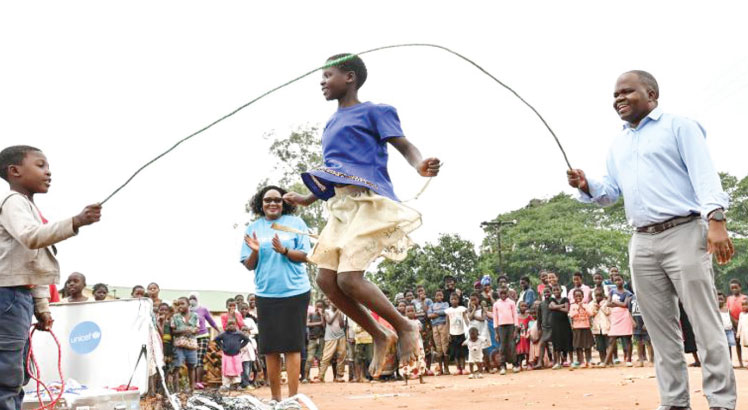Faced with a crisis that would potentially infringe on the rights of children in evacuation camps, United Nations Children’s Fund (Unicef) has acted with speed to ensure children’s rights are secured by deploying child protection workers, Freelance journalist JACK MCBRAMS writes for Unicef Malawi.
When Cyclone Freddy landed in Malawi on March 11, it caused floods, mudslides and rockslides across 15 councils in the Southern Region, sweeping away houses, property and people.
According to the Department of Disaster Management Affairs (Dodma), the disaster has affected 2.2 million people, leaving about 700 dead and more than 600 000 displaced.
As of March 24 2023, 577 camps had been set up to accommodate the displaced.
In response, Unicef Malawi has deployed 34 child protection workers and six mental health experts in some of the camps to deal with the mental health issues that some of the displaced children and youths might experience as a result of being witness to the disaster.
Unicef child protection specialist Malla Mabona, said the UN agency is providing child protection services to children that have been displaced.
She explained that in the camps, they are establishing safe corners for children aged between six to 18 and setting up child development community centres for those aged between three to five.
“These are being developed right there in the camps with the help of the 34 child protection workers as well as the six mental health experts that we have deployed to Nsanje, Chikwawa, Mulanje, Phalombe, Blantyre and Chiradzulu,” she said.
Children playing with play materials provided with support from Unicef
Mabona explained that the specialists will provide psychology first aid and general psychosocial support.
“They will also work at creating awareness of other issues such as child rights and the prevention of sexual abuse,” she said.
Mabona noted that the first task in the camps will be to identify separated or unaccompanied children and refer them to the district social welfare office for alternative care arrangements.
“We will also be doing family tracing for the unaccompanied children to try and get hold of their guardians,” she said.
Dina Gumulira has been deployed to lead a team of mental health specialists in Chikwawa district.
She explained that the experts have been drawn from a national mental health task team.
“We consider children as the most vulnerable group in any community and so when a disaster such as this strikes, it is usually the most vulnerable groups that are mostly affected, for instance the children,” Gumulira explained.
She added that in the case of children, it is often difficult to tell with the naked eye if they have suffered any trauma.
Gumulira said: “Children’s trauma is difficult to notice. The ways that children express themselves to social mishaps may not be expressive. They may be playing normally and you think they are okay.
“But what we have to know is that whatever traumatic experience will have an impact on their general development. Even their performance in school and their social lives may be affected.”
She explained that the first task for the group is to go into the displaced communities, identify the psychosocial issues and then come up with a number of interventions.
“Some of the approaches that we may apply include psychological first aid and child protection case management as well as other different tools to support these children in many ways,” Gumulira said.
She added that the mental health experts are equipped with the skills to conduct activities that will meet the psychological needs of the affected people.
“We will establish structures where there are none. We will also ensure that they have access to services that will help them heal, such as early childhood development centres in the camps, children’s corners and youth groups.”
Gumulira said the team will work with existing committees in the camps as well as volunteers.
“We will set up mechanisms for child support groups,” she said.
Cecilia Sokosi, a child protection officer who has been deployed to Kapeni Camp in Blantyre, explained that the main task of the team is to get the affected children to express themselves regarding the experience.
“Kids under these circumstances find it difficult to express themselves. But we have the expertise to get them to express their experience and gauge their trauma. We should not forget that some of their kids have lost their parents and family so ensuring that we treat their trauma is an important part of this exercise,” he said.
The post Child protection in emergencies first appeared on The Nation Online.
 Moni Malawi
Moni Malawi 
